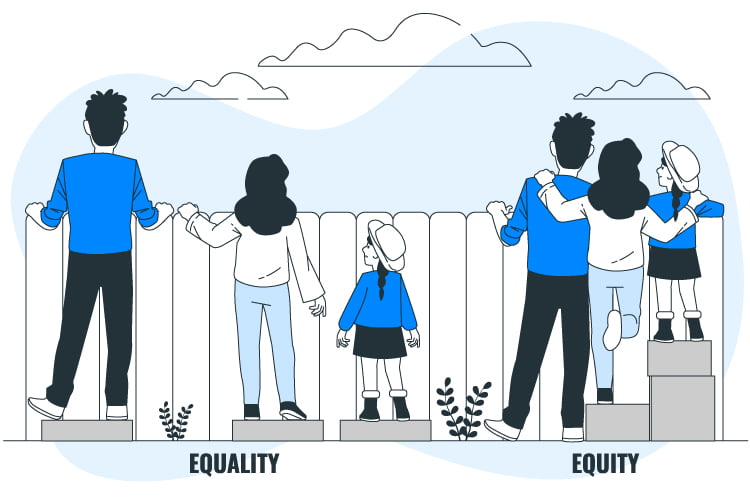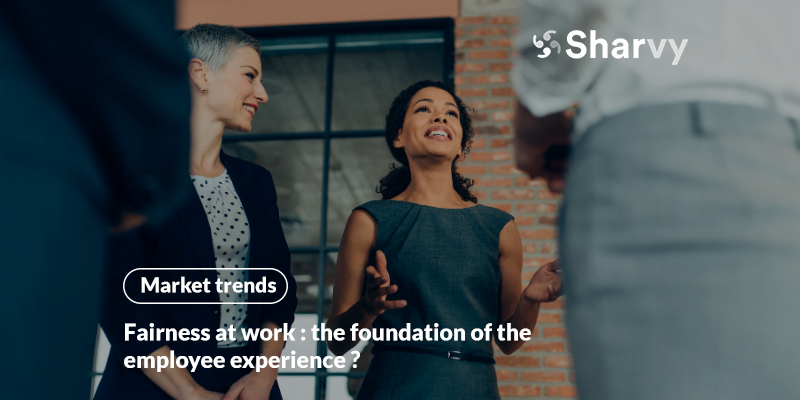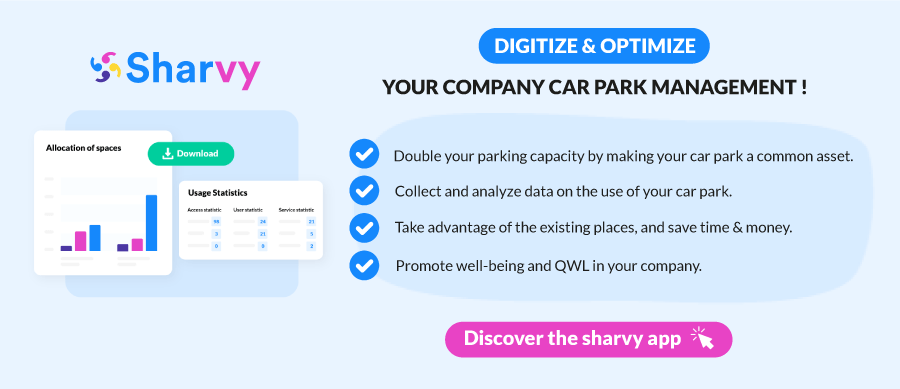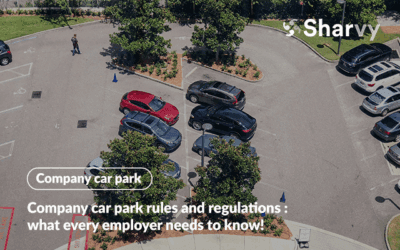Observers of the business world have been hammering it home for years: the health crisis has reshuffled the deck in the world of work & from now on, the HR sector must transform itself to respond to the new changes in the workplace and the new expectations of employees.
From now on, employees have high expectations of companies’ CSR strategies, and the notion of fairness in the workplace cannot be ignored. It must be the keystone that influences all a company’s HR policies.
However, fairness is difficult to implement within organizations since it requires subjectivity. For fear of grievances, some decision-makers avoid taking this notion into account. But unconsciously, they can create and fuel a tense social climate within the company.
So, how do you think you could go about it? How important is fairness in the workplace today? And how can you guarantee it within your organization? All the answers are in this article.
What is fairness at work?
There’s no doubt about it : fairness promotes impartiality and justice in business. In other words, this notion implies that the employer must accord the same values, benefits, and opportunities to all employees who contribute similarly.
Based on equal opportunities, this concept excludes pay discrimination and other discrimination linked to personal attributes (such as gender, age, origins, beliefs, opinions, disabilities, physical appearance, sexual orientation, etc).
But why is it so important? Because this principle is, first and foremost, a pillar of professional fulfillment and well-being. The slightest feeling of unfairness can lead to stress, fatigue, emotional wear and tear, frustration, jealousy, complaints, and many other reactions that harm the individual and the organization.
A company that promotes fairness significantly improves the employee experience and, in correlation, employee satisfaction and retention. In the long term, this substantially improves the company’s overall performance: a triple benefit (not to be underestimated) !
Equality and fairness at work : What are the differences ?
Do you treat all your employees equally and fairly? Although these two words sound similar, their meaning and application in the working environment are distinct.
Equality attributes the same benefits and opportunities to all employees. However, it does not take into account existing inequalities.
Equity, on the other hand, is based on the principles of justice and aims to restore initial inequalities by allowing everyone to achieve the same final opportunities. In other words, it’s about flexible equality, adapting to each employee, and ‘leveling’ the playing field.
While the boundaries between these two notions are (still) blurred, let’s say that a picture is worth a thousand words to explain the difference between these two concepts :

5 ways to ensure fairness at work!
1. Identify fair and egalitarian criteria within your company.
Promoting equality does not mean promoting fairness in the workplace, but it is one of the steps towards it. So, take the time to draw up a list of fair and egalitarian criteria within your company, which you can use to help you make critical decisions. For example :
- Egalitarian criteria cover what you want to offer all your employees, whoever they may be. These criteria are standard to all. They could be an end-of-year bonus, a pay rise in line with inflation, flexible working hours, or benefits such as a Swile card, a discount on public transport, access to the company car park, etc.
- Fair criteria combine all the requirements that will change depending on the employee. In other words, you will adapt specific criteria & personalize them. For example, all your employees have the right to training (in other words, this means guaranteeing equal opportunities). Still, some will be given priority (in order of arrival, depending on the urgency of the need). In the same way, everyone can be entitled to an end-of-year bonus based on the company’s results. On the other hand, an employee who arrives during the year may receive a different bonus from the other employees.
However, there are bound to be many criteria where the dividing line between equality and fairness will take longer to define. For example, by offering all employees access to the company car park, you are putting everyone on an equal footing.
But is it fair? Not really. Let’s consider a company car park with 80 spaces for 150 employees. Early risers will be spoilt for choice when finding a free parking space every morning. However, after 9am, spaces will become scarce.
However, by opting for a parking management solution such as Sharvy, you can benefit from a fair and efficient allocation of parking spaces, not least because the Sharvy application works according to an appropriate algorithm. The application manages their arrival on-site & allocates them spaces via a fair algorithm (considering the number of reservations previously made).
2. Avoid cognitive bias.
There’s no doubt about it : cognitive biases are terrible in the workplace! They are distortions of judgment that lead to discriminatory and unintentional decision-making. Unconsciously, they affect our thinking and distance us from notions of fairness and equality.
To overcome these cognitive biases, it is first necessary to identify them so that each branch of the company can be made aware of them, then to observe how they manifest themselves and, in particular, to understand how to avoid them.
For your guidance, some of the most common and counter-productive biases when it comes to fairness are listed below :
- Similarity bias is the manager’s tendency to favor and recruit candidates who are similar to them and who share common values, experiences, and tastes. Unfortunately, however, this can be detrimental to diversity and inclusion within your company. So, dare to be different and strive to build a team that doesn’t look the same but complements each other.
- Perception bias also comes into play during the recruitment phase and continues within the organization, particularly when a new employee arrives. Unconsciously, some employees may make judgments based on the employee’s age, gender, or physical appearance (e.g., handling jobs may favor firm, robust profiles). These are unfounded beliefs and assumptions based on one’s environment.
- Stereotype bias leads individuals to consider certain information sufficient to make a decision. They make associations between character traits and specific information, from which they draw hasty conclusions.
While there are over a hundred cognitive biases, the three listed above have the most significant impact on the notion of fairness, which calls for impartiality. So encourage divergent thinking among your staff and managers. When recruiting, interview several people to compare different points of view, then create various frames of reference and reading grids.
3. Set fair objectives for all your employees.
Remember : promoting equity within your company means defining collective and individual SMART objectives. These guide companies in determining precise, quantifiable ambitions anchored in a realistic timetable.
SMART (Collective) objectives refer to a universal goal. They involve all your employees, encourage cooperation and group cohesion, and support motivation since everyone can see their contribution to the company (which is rewarding) and gives meaning to their work. On this point, you will be egalitarian (a sales target for everyone, with qualitative and quantitative objectives).
SMART (Individual) objectives mean that these objectives evolve according to the employee, their know-how, their position, their skills, their ambitions, and so on; on this point, you will be more equitable than egalitarian. In particular, the list of individual objectives will form the basis of the managers’ work with their teams. They will assess the past year’s successes, the flops, the objectives achieved, and so on. Then, they will give each employee SMART objectives based on the year that has gone by.
For example, a common practice in some companies is to use SMART goals to ensure fairness in performance evaluations. Each employee receives goals that are clear, measurable, and tailored to their role, skills, and experience. This not only reinforces employee engagement by aligning them with the company’s values but also promotes their development by clarifying expectations. This approach also contributes to improving the quality of life at work and productivity, by giving everyone a fair chance to succeed while reducing absenteeism. Ultimately, this method becomes a true lever of engagement that supports the company culture and enhances organizational performance.
4. Establish clear & transparent policies, then justify your choices!
Remember one important point : fairness and equitability means making the right decisions, valuing transparency, and justifying your choices. This last point is essential because making decisions without explanations can lead to misunderstandings, interpretations (often unfounded), and injustices.
So, make every effort to establish clear and transparent policies within your company. Let’s take one example to illustrate our point : the company car park. We’re not telling you anything new by pointing out that parking is one of the irritants of everyday life for many companies. It’s a thorny issue that often leads to employee frustration and injustice.
The reason is apparent : the massive use of teleworking with the new organizational methods that have taken hold in recent years, such as flex office and desk sharing, is turning company car park management on its head. As a result, many parking spaces still need to be occupied. Unfortunately, these parking spaces, often reserved for employees, cannot be used by other employees.
In this respect, your company can differentiate itself by adopting a healthy, thoughtful parking management policy because a fair and efficient allocation of parking spaces must consider the notion of fairness while considering the individual characteristics of each employee.
As a result, for some employees, using a car is unavoidable due to the distance between home and work, a house with poor public transport links, children to be taken to and from work every day, medical constraints of some kind, etc.
It makes sense to guarantee them access to the company car park. However, this does not mean that employees without allocated spaces will not have access to the car park. They will benefit from “shared” spaces (flex parking). However, to ensure that spaces are also shared relatively, it is a good idea to use a parking management application such as Sharvy.
5. Offer everyone fair flexibility.
This last point may seem obvious, but it’s worth remembering. As an employer and manager, you benefit everyone or no one on specific criteria.
For example, suppose you decide to be flexible about working hours (in particular, when you arrive and leave the company). In that case, you need to offer this flexibility to all your employees. So don’t just offer it to managers or those with children and other commitments.
In the same way, fair flexibility also means offering to telework to all your employees and discussing a common objective for all teams, but allowing each person to achieve it according to their way of working, way of thinking, and method.
In conclusion
Undoubtedly, achieving fairness in the workplace is a journey that requires commitment at all levels of the organization : human resources, employers, managers, and employees.
This is why it is essential to monitor the organizational practices and policies implemented within your company to ensure that they promote equity and fairness, two pillars of the employee experience. It is the abuse, disproportion, and disregard of the use of these policies that will make them unacceptable.
As a result, it’s easy to see how important it is to treat your employees fairly, who will focus more on their objectives and less on their moral wounds. They will be more ready to accept their responsibilities, changes, and new challenges within the company.
Have a question ? Check out the FAQ !
Where does the confusion between fairness and equality come from?
Indeed, these two concepts are often confused for two reasons : firstly, because they are closely linked, and secondly, because they operate in the same context: that is, around the issue of justice. It isn’t easy to differentiate between these concepts. However, despite their common goal (to promote justice for all), equality and equity act differently.
As a reminder, equality strives to treat individuals equally, while equity recognizes and considers the different starting points of individuals/groups. Both approaches must be regarded to achieve accurate equity, and a commitment must be made to dismantle the systemic barriers perpetuating inequity.
So why is promoting fairness in the workplace fairer than equality?
Equality is based on the principle that all your employees start from the same point and that offering everyone the same working conditions is enough to achieve social justice.
But, as mentioned above, this is rarely the case within a company. Some employees may face more obstacles and difficulties because of their circumstances. Fairness seeks to consider these differences and provide everyone with what they need to succeed. Promoting fairness in the workplace is so much fairer in business because it allows everyone to achieve their full potential.
How can workplace equity contribute to employee well-being and business performance?
Workplace equity is crucial for employee well-being and improving quality of life at work (QWL). By adopting fair and inclusive management practices, companies boost employee engagement, enhance human capital, and reduce risks like burnout. This, in turn, drives business performance and promotes a safe work environment.
Companies that prioritise equity see lower turnover, increased employee loyalty, and higher performance. Initiatives such as flexible leave, improved health and safety measures, and better workplace conditions foster team spirit and help retain top talent, ultimately benefiting both employees and the business.
Want to learn more? Check out latest articles!
5 mistakes to avoid when integrating car park management software!
What are the 5 most common mistakes to avoid before and during the integration of parking management software? Focus!
Company car fleet: best management practices!
Should you electrify, pool or automate your company car fleet? What are the best management practices? Let’s take a closer look!
Company car park rules and regulations: what every employer needs to know!
Discover the essential company car park rules and regulations in the UK and ensure your business stays safe, accessible, and compliant.
Subscribe to our newsletter!
PARKING & WORKPLACE MANAGEMENT SOLUTION
Car park management - Charging points monitoring - Desk booking - Booking by time slots
SUBSCRIBE TO THE NEWSLETTER
Receive the latest Parking & Workplace trends by email once a month.













